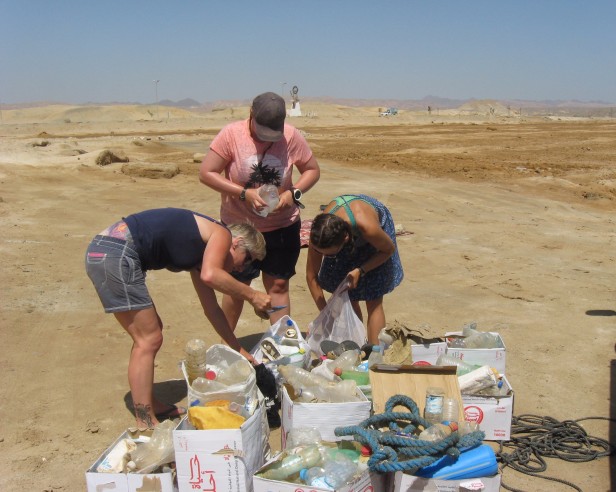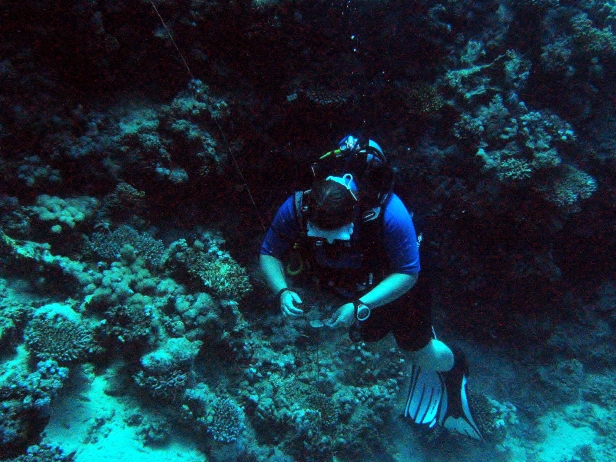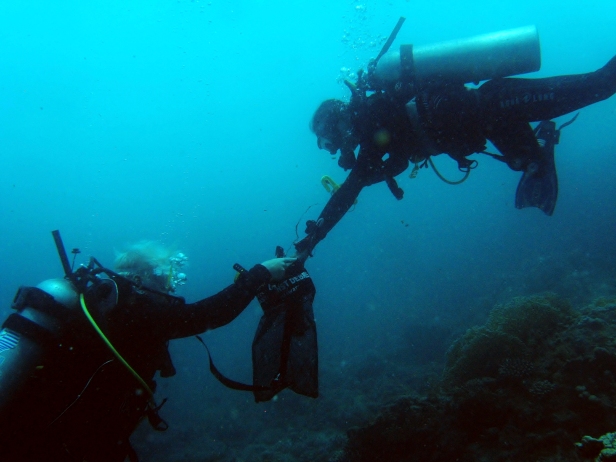A few days ago Stacey and Clara joined some volunteers doing some super fun beach and reef cleaning. Upon arrival to Abu Hamara the group piled out of the bus and were immediately hit with a wall of intense heat. The site was beautiful but looking closer gave a very different perspective… The first task was the beach clean up which involved gathering everything that didn’t belong there, including items such as plastic bottles, drink cartons, loose plastic, polystyrene or foam, empty tuna cans, stray shoes or flip flops, tatty jeans… it seemed as if people used the ocean as a giant rubbish pit, and it was endless! You would pick up one bottle then look up and ten more would appear. Everything had just washed up from the shore, and as the sea level had decreased over the years it left some dirty treasures behind. Working in the heat was almost unbearable although the litter picking became quickly addictive, not wanting to leave anything behind. The group gathered as much as they could carry and returned to the bus, filling mesh bags and cardboard boxes with their treasures. It was unfortunate that this was only but a small portion of what was there, however it felt like it helped to clean the place up and make it feel itself again. The team managed to bring together 183 plastic bottles, 90 food cans, 76 glass fragments, 46 plastic fragments, 43 cartons, 35 bottle caps, 11 shoes, 7 insoles, 6 beverage cans, 3 aerosoles and one very stinky nappy.

After the beach was given a pamper, the team kitted up with all their heavy duty diving gear, line cutters and mesh bags, then headed into the water to do some line cutting. Following the rope down it seemed there was nothing out of place. The corals thrived and beated out various shades of violet, pale blue, yellow, pink and green, blooming like an overgrown underwater garden. The guide took the team further in and indicated the first tangled fishing line. It was untangled as much as possible however some parts had been there for so long the corals actually began to grow around the line, therefore pulling it would damage the coral further and so these parts were cut. Looking further ahead more and more appeared. Some lines were still attached to hooks which were removed and embedded into small wooden logs and put in mesh bags. Fishing lines are left behind from fishing boats and can get entangled in the corals or wrapped around an animal cutting off the blood supply or causing starvation; fishing hooks can pierce the skin of an animal or, if swallowed, fishing lines or hooks may cause internal blockages, injury or poisoning. So along with dampening the beauty of the reef the fishing waste is very detrimental towards reef life. It was painful to leave some parts behind, but the group removed as much as they could with the little time they had under the water.

Despite the circumstances the team had fun cleaning up the reef of Abu Hamara and were able to appreciate the true beauty once they cleared the waste away. It was a very fulfilling experience and just shows how important it is to put your rubbish in the bin! Reefs like Abu Hamara show the purest beauty and contain so much biodiversity that must be treasured forever. The team look forward to their next clean up!


